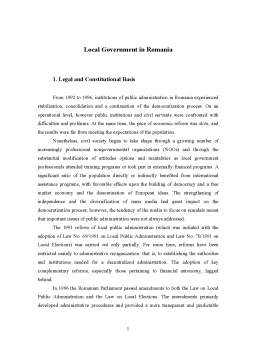Extras din referat
Legal and Constitutional Basis
From 1992 to 1996, institutions of public administration in Romania experienced stabilization, consolidation and a continuation of the democratization process. On an operational level, however public institutions and civil servants were confronted with difficulties and problems. At the same time, the pace of economic reform was slow, and the results were far from meeting the expectations of the population.
Nonetheless, civil society began to take shape through a growing number of increasingly professional nongovernmental organizations (NGOs) and through the substantial modification of attitudes options and mentalities as local government professionals attended training programs or took part in externally financed programs. A significant ratio of the population directly or indirectly benefited from international assistance programs, with favorable effects upon the building of democracy and a free market economy and the dissemination of European ideas. The strengthening of independence and the diversification of mass media had great impact on the democratization process; however, the tendency of the media to focus on scandals meant that important issues of public administration were not always addressed.
The 1991 reform of local public administration (which was initiated with the adoption of Law No. 69/1991 on Local Public Administration and Law No. 70/1991 on Local Elections) was carried out only partially. For some time, reforms have been restricted mainly to administrative reorganization: that is, to establishing the authorities and institutions needed for a decentralized administration. The adoption of key complementary reforms, especially those pertaining to financial autonomy, lagged behind.
In 1996 the Romanian Parliament passed amendments to both the Law on Local Public Administration and the Law on Local Elections. The amendments primarily developed administrative procedures and provided a more transparent and predictable framework for litigation among various actors at the local level. The most important improvements were the introduction of provisions regulating the accountability of prefects for inappropriately suspending the acts of local governments ,direct universal vote in county council elections and a clearer definition of the powers of local authorities.
In the last four years emphasis in local development has shifted toward regionalization and regional development policies. This has happened due to both the desire to harmonize with the European Union’s systems and structures as a prelude to integration and efforts to address development problems that resurfaced after 1989.
2.Brief History of Local Self-government
Although issues of local governance existed before modern times, it was after 1830 that significant changes began to take place. Cities were granted autonomy, the two Romanian principalities (Moldavia and Montana) were united, and French-inspired legislation was introduced to remove organizational differences between them. The period from 1866 to 1923 witnessed the most important advances in local governance, as the principles of decentralization and local autonomy were enforced and Romanian provinces were harmonized. Between 1929 and 1944, several administrative measures were taken to create a higher degree of administrative decentralization and to establish territorial units, local services and county associations. Under the influence of the Soviet Union after 1944, the bureaucracy was a strict and total hierarchy both vertically and horizontally. Law No. 5 (September 1950) established a soviet territorial organization for Romania, introducing the district and the region as new administrative units. Between 1950 and 1989 the administrative and political systems were developed to incorporate every public institution and economic unit into a unique network based on subordination, control and coordinated relations
centrally managed by the Communist Party.
Preview document
Conținut arhivă zip
- Local Government in Romania.doc























